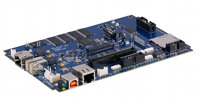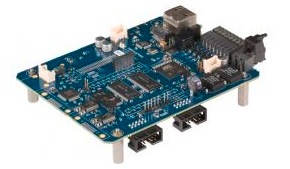ARM9 SBC has extensive I/O
Aug 10, 2011 — by LinuxDevices Staff — from the LinuxDevices Archive — 10 viewsSealevel Systems introduced an ARM9-based single board computer (SBC) that runs Windows CE 6.0 on an ARM9 processor. The Relio SBC-R9-2100 includes an Atmel AT91SAM9263 CPU, 128MB of RAM and 256MB of flash storage, and extensive I/O including Ethernet, serial, USB, CAN, and digital interfaces, the company says.
 Relio's earlier SBC-R9 (Click image to enlarge) |
The latest product from South Carolina-based Sealevel is a downsized version of the company's previous SBC-R9, which also formed the basis of a compact embedded computer known as the Relio R9. Like the SBC-R9, the R9-2100 runs Linux or Windows CE, although the Linux support is running late and won't arrive until the fourth quarter. The previous SBC-R9 measures about 7.5 x 5 inches in size and costs approximately $600, whereas the new SBC-R9-2100 measures 4.9 x 3.9 inches and costs just $400.
So where have the economies been achieved? Well, for one thing, the SBC-R9 featured a LCD controller, a five-wire interface for resistive touchscreens, and the ability to drive displays up to 2048 x 2048 pixels. No mention of video support is made for the SBC-R9-2100 at all, suggesting that it needs to be driven via a serial console or an onboard web server.
 However, the SBC-R9-2100 (pictured) again gets Atmel's AT91SAM9263, which has an ARM9 core that Sealevel has clocked at 200MHz. The AT91SAM9263 offers features including 96K of on-chip SRAM, 10/100 Ethernet, USB host and device ports, camera interface, LCD controller, and a 2D graphics co-processor, according to Atmel. (For more details, including a block diagram of the SoC, see our earlier coverage, here.)
However, the SBC-R9-2100 (pictured) again gets Atmel's AT91SAM9263, which has an ARM9 core that Sealevel has clocked at 200MHz. The AT91SAM9263 offers features including 96K of on-chip SRAM, 10/100 Ethernet, USB host and device ports, camera interface, LCD controller, and a 2D graphics co-processor, according to Atmel. (For more details, including a block diagram of the SoC, see our earlier coverage, here.)
The SBC-R9-2100 also gets the same 256MB of onboard flash storage as the SBC-R9, and has 128MB of standard RAM rather than the R9's 64MB. The initial version is once again supplied with a Windows CE 6.0 BSP (board support package), and with binary and low-level drivers for system I/O. It also supplies Sealevel's Talos I/O Framework, said to offer a high-level .NET Compact Framework interface with built-in support for analog and digital I/O.
According to Sealevel, the SBC-R9-2100 has a 10/100 Ethernet port with RJ45 connector, a CAN 2.0b interface, and digital I/O that consists of two dry contact inputs and two powered digital outputs (5VDC @ 30mA max). It also offers two RS232/422/485 ports, one USB device port (mini Type B), and one USB host port (Type A), the company adds.
Specifications listed by Sealevel for the Relio SBC-R9-2100 include the following:
- Processor — Atmel AT91SAM9263 clocked at 200MHz
- Memory — 128MB of RAM and 256MB of flash storage
- Networking — 10/100 Ethernet port
- Other I/0:
- 1 x USB 2.0 device port (mini Type B)
- 1 x USB 2.0 host port (Type A)
- CAN 2.0b bus interface
- 2 x RS232/422/485 ports
- 2 x dry contact inputs
- 2 x powered digital outputs (5VDC @ 30mA max)
- Power requirements — 7 to 30VDC @2.5W
- Operating temperature — -40 to 85 deg. C (-40 to 185 deg. F)
- Dimensions — 4.9 x 3.9 x .75 inches
- Weight — 1 pounds approx.
Availability
The Relio SBC-R9-2100 appears to be available now with Windows CE, with the Linux BSP due in the fourth quarter. More information may be found on the SBC-R9-2100 product page.
Jonathan Angel can be reached at [email protected] and followed at www.twitter.com/gadgetsense.
This article was originally published on LinuxDevices.com and has been donated to the open source community by QuinStreet Inc. Please visit LinuxToday.com for up-to-date news and articles about Linux and open source.